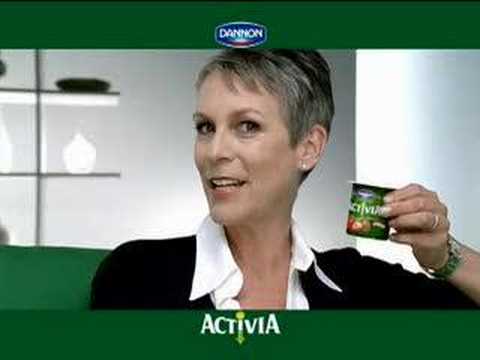I hate the phrase, food scare.
Hate is a strong word, but when it comes to food poisoning outbreaks that kill little kids and others, it’s not a scare, it’s real.
 A scare implies former scream-queen Jamie-Lee Curtis flogging yoghurt that makes people poop.
A scare implies former scream-queen Jamie-Lee Curtis flogging yoghurt that makes people poop.
That’s a food scare.
See how many times the N.Y. Times can use the word scare in its opening paragraphs:
The European Union on Monday notified the food safety authorities in Britain, France, Sweden and Switzerland to be on the lookout for contamination in eggs after a food scare in Belgium, Germany and the Netherlands.
Anna-Kaisa Itkonen, a European Commission spokeswoman, said, “We do not know if the eggs are contaminated or not, but because of these notifications, it’s now up to the national authorities to check.”
The scare over contaminated eggs, which began in Belgium, has led supermarkets there and in Germany and the Netherlands to clear shelves of the product as the crisis entered its third week.
The removal of eggs from shops was prompted by the discovery of the insecticide fipronil in some shipments. The contamination is thought to have been caused by the mixing of the insecticide with a cleaning agent used at chicken farms. The scare began July 19 when the government of Belgium said that fipronil had been found in eggs produced there.
Major supermarket chains in Belgium, including Delhaize and Colruyt, have stopped selling eggs from affected farms. In the Netherlands, one poultry producer declared bankruptcy on Friday as a result of the insecticide scare, according to an industry group.
The Dutch consumer safety authority has published a guide on identifying the tainted eggs through a 10-digit serial number stamped on the shells. The country’s biggest supermarket chain, Albert Heijn, stopped selling many eggs last week, but the company said that eggs were back on sale as normal on Monday. In the Netherlands, an estimated nine million chickens from about 180 farms have been affected.
In Germany, the supermarket chain Aldi withdrew all eggs from sale after the authorities said that about three million eggs imported from the Netherlands had been affected. Since then, fipronil contamination has been found at four farms in the German state of Lower Saxony.
 Fipronil is toxic in large quantities and can damage kidneys, liver and lymph glands. The Belgian and Dutch authorities are investigating how the contamination happened.
Fipronil is toxic in large quantities and can damage kidneys, liver and lymph glands. The Belgian and Dutch authorities are investigating how the contamination happened.
The Dutch poultry association said that farmers had no idea that cleaners were using the substance. Aalt den Herder, the group’s secretary, said the risk had been overstated.
“It was never an issue of human health, it was an issue of consumer confidence,” he said.
Yeah, except, as explained by the Irish Examiner:
Belgian authorities have now admitted they began investigating pesticide contamination in eggs in early June – several weeks before the public was made aware of a food safety scare affecting several European countries.
Kathy Brison, of the Belgian food safety agency, said on Sunday that a Belgian farm alerted authorities to a possible contamination in June, and they began investigating and alerted Belgian prosecutors.
German authorities are frustrated by the apparent delay in informing European neighbours.
German Agriculture Minister Christian Schmidt plans to speak to his Belgian counterpart about the issue on Monday.
And where would a risk communication failure be without the UK Food Standards Agency, who today reported, “We have no evidence that eggs laid in the UK are contaminated or that Fipronil has been used inappropriately in the UK. 85% of the eggs we consume in the UK are laid here.
“The number of eggs involved represents about 0.0001% of the eggs imported into the UK each year. Our risk assessment, based on all the information available, indicates that as part of a normal healthy diet this low level of potential exposure is unlikely to be a risk to public health and there is no need for consumers to be concerned. Our advice is that there is no need for people to change the way they consume or cook eggs or products containing eggs.”
Sounds good if they’re all getting “laid here.”
Once again:
Going public: Early disclosure of food risks for the benefit of public health
Mar.17
NEHA, Volume 79.7, Pages 8-14
Benjamin Chapman, Maria Sol Erdozaim, Douglas Powell
http://www.neha.org/node/58904
Often during an outbreak of foodborne illness, there are health officials who have data indicating that there is a risk prior to notifying the public. During the lag period between the first public health signal and some release of public information, there are decision makers who are weighing evidence with the impacts of going public.
Multiple agencies and analysts have lamented that there is not a common playbook or decision tree for how public health agencies determine what information to release and when. Regularly, health authorities suggest that how and when public information is released is evaluated on a case-by-case basis without sharing the steps and criteria used to make decisions. Information provision on its own is not enough.
Risk communication, to be effective and grounded in behavior theory, should provide control measure options for risk management decisions.
There is no indication in the literature that consumers benefit from paternalistic protection decisions to guard against information overload. A review of the risk communication literature related to outbreaks, as well as case studies of actual incidents, are explored and a blueprint for health authorities to follow is provided.

 turns a variety of hues depending on how sick you are.
turns a variety of hues depending on how sick you are. general from 39 states.
general from 39 states.
.jpg)